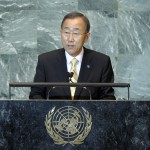One day after a delegation from the United Nations nuclear watchdog agency finished a visit to Iran, UN Secretary-General Ban Ki-moon told a press conference that he has been “urging the Iranian authorities to prove that their nuclear program is genuinely for peaceful purposes. I think they have not yet convinced the international community.”
Speaking with Israeli President Shimon Peres during a visit to Israel, Ban also called for a diplomatic resolution to the dispute over Iran’s nuclear program. “It is very important that the international community engage in a dialog with the Iranian authorities to resolve this issue peacefully,” Ban was quoted as saying in a press statement from Peres’ office.
“I urge the Iranians to engage in dialog. There is no alternative to a peaceful resolution of this issue.”
Iran is suspected of laying the groundwork for a possible nuclear weapons program by expanding a civilian program in ways that do not match peaceful needs. The International Atomic Energy Agency (IAEA) also remains concerned about possible military elements to the program. Iran has an extensive missile program and has repeatedly threatened Israel in the past.
Peres took a tougher line than Ban, saying in his comments that “while Israel welcomes the sanctions, in and of themselves they are not enough. I expect the international community not to take any option off the table, and to take determined action to prevent Iran from building a nuclear bomb!”
The Israeli official also noted that Iran’s role in global terrorism makes them a worldwide threat. “At this time, the UN has a decisive role to play in the war against global terrorism, at the head of which stands Iran,” Peres was quoted as saying. “No country is immune from terrorism—not the US, not the European states and not the countries of the Middle East.”
Peres later said Iran “finances and uses terrorism” and listed arms shipments to Hamas in Gaza and weapons to Hezbollah and Syria as examples.
The Israeli president and the UN head’s joint press conference comes as the IAEA released a statement on the recent visit of agency officials to Tehran. The meetings were “aimed at resolving all outstanding substantive issues.” Another meeting in Iran is set for February 20-21.
The IAEA press statement said the agency in the visit “explained its concerns and identified its priorities, which focus on the clarification of possible military dimensions to Iran’s nuclear program.”
The meeting with Iran comes several months after an IAEA report on Tehran’s nuclear program. IAEA Director General Yukiya Amano said in comments published by the IAEA website in late 2011 that they have information indicating Iran has conducted activities relevant to nuclear weapons work prior to 2003 and said “some activities may still be ongoing.”
Like Ban, the IAEA is trying to create some sort of communication with Iran over the nuclear concerns, and in the recent visit “discussed with Iran the topics and initial steps to be taken,” according to Wednesday’s press release.
“The Agency is committed to intensifying dialogue. It remains essential to make progress on substantive issues,” Amano was quoted as saying in the statement.
Despite the call for communication and a “peaceful resolution,” Ban did say he is “deeply concerned by the latest report” from the IAEA regarding Iran.
Iran has come under increasing pressure and censure from the United States and Europe over the nuclear program, including intensified sanctions targeting Iran’s oil and banking industries. It remains to be seen if Iran will engage in what the West believes is a substantive enough discussion over the nuclear dispute to resolve it diplomatically.
(By Joshua Spurlock, www.themideastupdate.com, February 1, 2012)

